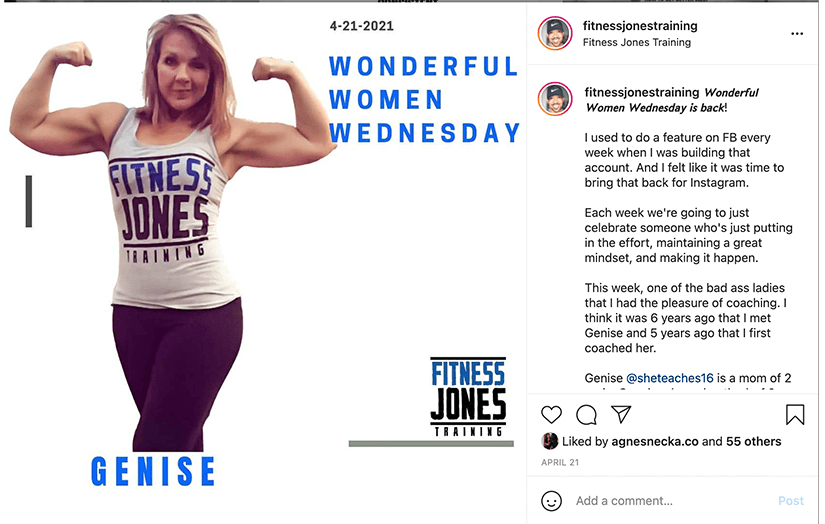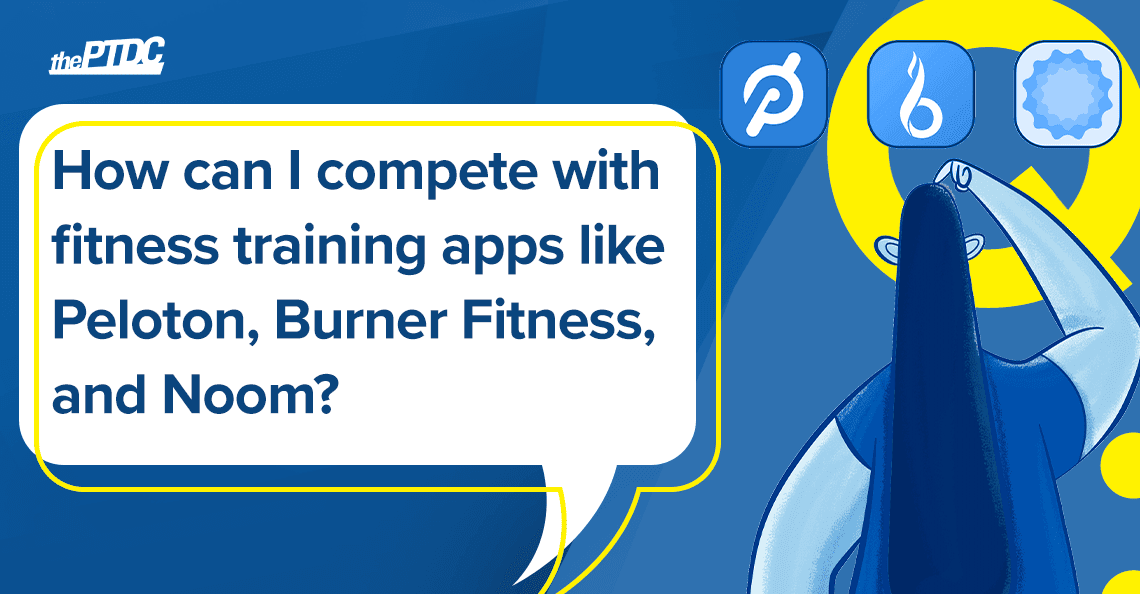 There are a few massive companies with the slickest apps that money can develop.
There are a few massive companies with the slickest apps that money can develop.
You wonder how you can possibly compete with these big players. But I’ve got good news for you …
You are not that. You are you—and that’s your biggest selling point.
How can I compete with fitness training apps like Peloton, Burner Fitness, and Noom?
They are not your competition.
- You can’t compete with their ad spend.
- You can’t pitch the same marketing messages.
- You can’t come close to matching the production values of their videos.
- Or the sheer volume of their streaming videos.
If you try to compete with, say, Les Mills, you’ll have your shirt handed to you.
These are billion-dollar companies that hire charismatic people and high-end film crews. They create way more great-looking content than anything you could hope to do.
You try to play their game, you will lose.
So don't play their game. Play your own. That’s the trick.
Use some marketing jujitsu. With the right leverage, angles, and timing, you can thrive in this marketplace. The behemoth companies lack what you have:
YOU.
In fact, I think that as these big players come in and dominate the low-end market with memberships and streaming and group-fitness apps, that’s your opportunity.
That’s when being small and connecting at a deeper level becomes much more valuable.
Only you can connect like that. You think an app is going to inspire loyalty? Nope.
No fitness app can connect like a person can.
You know who inspires loyalty? Someone like Carolina Belmares.
Maybe you know her from the Online Trainer Show. If you’re not listening, start—it’s fun and you’ll learn a lot.
Carolina right now is with an amazing man, but at one point she was single with three kids, a Mexican expat living in Canada.
That’s not easy, right? She was able to find comfort and support in a Facebook group—basically a group for Mexican single mothers who had relocated to Canada or the United States.
There were a few thousand people in this group who shared these uncommon commonalities.
They had this “1 percent uniqueness” about them.
Carolina saw like-minded people in this group, women who faced similar challenges. And in that group she met other single moms, she shared and chatted and did all the things you do in a group like that.
She made connections. Which is what an individual personal trainer does. And a big company cannot do.
Carolina shared her story, about having a daughter in Mexico as a teenager, meeting someone online from Canada, moving, having two more children, and then a divorce. And about how she found fitness.
Her story resonated. Turns out there were other women in this Facebook group, other mothers interested in fitness.
Lots of them, in fact.
See what she did there? She didn’t cast a wide net, trying to appeal to moms. She found a specific group at the fringes of that market. A group that she understood.
Fitness had changed her life. She wanted others to experience that. So she posted an offer in that Facebook group: She’d give a presentation on fitness to anyone who was interested.
Then she sat back, wondering what would happen.
It didn’t take long. Ten people, 20, 50 people responded. She ended up with 800 responses! That’s 800 people wanting to attend her presentation and pay for it.
That’s how it works. One post in one Facebook group generated 800 leads. First it was just for her webinar. But then that group filled her online personal training clientele.
If something works once, cool—maybe you got lucky. If it works a second time, there’s something there.
Carolina did it a second time. It worked again—and she charged a few bucks more, of course. And she was off to the races, filling her entire clientele from the webinar.
What’s your story? How can you connect?
When it comes to competing with the big apps, I want you to think like Carolina did.
Do NOT think big. Think small.
There is no way a big fitness app is going to be able to appeal to Mexican expat single mothers living in Canada or the United States.
Now, in Carolina’s case, her story matched her clients’ stories, which is great.
But what if you are not your client’s avatar? That’s fine—you don’t have to be.
Another host on our podcast is Ren Jones, an Online Trainer Academy Level 2 graduate. He’s a 40-something man. His clients are 40-something women.
But he’s devoted to his clients because he lost three women in his life—his mother and two sisters. Not necessarily because of a lack of fitness, but inactivity may have contributed.
He’s passionate about helping women live their strongest, fullest lives. He tells his story, he creates content—like his “Wonderful Women Wednesday” series on IG—that resonates with women in their 40s, and he has a thriving, fulfilling business.

This is why people sign up with him.
So how do you compete with big business? Don't play their game.
Find your following on the fringes. Find a reason why people would buy into your story, your passions, and not pay someone else, or pay a big, anonymous company.
Your future is probably out on the fringes. But from there, it starts to grow.
And once that connection is made—guess what, price doesn’t really matter anymore.
When you inspire loyalty, when you connect deeply, the compensation picture changes. Clients will pay more for that connection.
That’s something the big companies can’t do.
Learn more: Get answers to more online trainer questions.











